Submitted:
25 October 2024
Posted:
29 October 2024
You are already at the latest version
Abstract
Keywords:
1. Introduction
2. Factors Influencing the Electrical Performance of Photovoltaic Solar Modules
3. Need to Reduce the Temperature of Photovoltaic Solar Modules
4. Methods of Cooling Photovoltaic Modules
4.1. Cooling of Photovoltaic Modules by Natural Air Convection
4.2. Cooling PV Modules with Finned Heat Sinks
4.3. Cooling of Photovoltaic Modules by Forced Air Circulation
4.4. Cooling Photovoltaic Modules Using Artificial Roughness
4.5. Cooling of Photovoltaic Modules by Thermal Energy Storage
4.5.1. Cooling by Integration with Phase-Change Materials
4.5.2. Cooling of Photovoltaic Modules by Heat Pipe
4.5.3. Cooling of Photovoltaic Modules by Integrating Porous Media
4.6. Cooling of Photovoltaic Modules by Coupling Fins or/and Baffles with Phase-Changing Material
4.7. Cooling by Improving Absorption of Solar Radiation
4.7.1. Radiative and Photonic Cooling
4.7.2. Thermoelectric Cooling of Photovoltaic Modules
4.7.3. Cooling by Integrating Photovoltaic Modules in Buildings
4.7.4. Cooling by Using Bifacial Photovoltaic Modules
4.8. Cooling by Different Configurations of the Conduits and Absorbers
5. Conclusions
- The cooling of PV modules by fin heatsinks provides an improved heat transfer zone to promote a greater heat transfer from the rear surface of the PV module to the ambient air through natural convection.
- Cooling technique using artificial roughness (baffles, circular or triangular ribs) is a very effective method that significantly reduces the temperature of PV modules, which increases the coefficient of heat transfer between circulating air and absorber.
- Cooling techniques using rectangular tunnel absorbers, hexagonal honeycomb absorbers, extruded absorbers behind the PV module and jets impacting in the air flow channel ensure good cooling of the PV modules. Hexagonal honeycomb and V-groove heat absorbers have shown the highest electrical performance of PV modules.
- Cooling of PV modules by storing thermal energy using phase-change materials, heat pipes and porous media. These cooling techniques result in a significant change in the temperature of PV modules. Latent heat transfer through the PCM occurs during material melting, resulting in a high heat transfer rate. The electrical power and electrical efficiency of PV modules depend mainly on the thickness of the PCM. However, the application of PCM is limited by its high cost and low thermal conductivity. Heat pipe cooling reduces the operating temperature of PV modules. Porous media also play an important role in heat storage. They have a very large influence on the electrical performance of a PV module.
- Thermoelectric cooling improves the electrical performance of PV modules by increasing the amount of solar radiation. The PV modules integrated into the building maintain electrical efficiency even if solar radiation increases. Bifacial PV solar modules also have potential for improved power generation compared to conventional PV solar modules. The design of the single-pass bifacial PVT hybrid collector is better when electrical energy is desired and if thermal energy is desired, dual-path parallel flow design is the best option. Photonic cooling of PV solar cells improves the thermodynamic property of semiconductor materials where the increase in temperature leads to a decrease in the electrical efficiency of PV modules. Radiative cooling with the sky is a passive cooling method that optimizes the conversion of solar radiation from PV solar cells in outdoor conditions, thus improving their efficiency of electrical power conversion.
- The forced air-cooled PV module offers better cooling and energy conversion efficiency compared to natural air circulation. The electrical power and electrical efficiency of PV modules obtained from different active cooling techniques is mainly affected by the geometry of single-channel or double-channel cooling channels, glazing, insulation, the extended surfaces, the angle of inclination and their mass flow rates.
- Several calculation methods and software have been used for the modelling and simulation of the heat transfer process and the cooling process of PV modules. A numerical simulation of mono, di and three-dimensional mathematical models, whether they are in steady-state or in dynamic mode, allow the determination of the temperature distribution of the PV module by numerically solving the governing energy equations with the finite difference method, the finished volumes or finished elements when the coolant flows. 1-D models provide more accurate results than 2-D and 3-D models because factors such as mesh quality, assumptions, and boundary conditions affect accuracy. However, they do not take into account the flow of fluid in all directions. In the 2-D and 3-D models, conduction and convection heat transfer are taken into account.
- Despite the low thermophysical properties of air, hybrid PVT air solar collectors are preferred in practice because their design does not require enough materials and their operating cost is low.
Author Contributions
Funding
Data Availability Statement
Acknowledgments
Conflicts of Interest
References
- International Energy Agency, IEA, « The global power mix will be transformed by 2028 », IEA.25 September 2024. https://www.iea.org/energy-system/renewables.
- Ritchie, H.; Rosado, P.; Roser, M. Fossil fuels. Our World in Data, janv. 2024, https://ourworldindata.org/fossil-fuels.
- Agrawal, B.; Tiwari, G.N. Building integrated photovoltaic thermal systems: for sustainable developments. in Energy series, no. 4. Cambridge, UK: RSC Pub, 2011.
- Bhatia, S. C. Advanced renewable energy systems. Woodhead Publishing India Pvt. Ltd., vol. Part I. in Woodhead Publishing India in Energy, vol. Part I. New Delhi: Vardaan House, 2014. www.woodheadpublishing.com.
- Kant, K.; Shukla, A.; Sharma, A.; Biwole, P.H. Thermal response of poly-crystalline silicon photovoltaic panels: Numerical simulation and experimental study. Sol. Energy 2016, 134, 147–155. [Google Scholar] [CrossRef]
- Kaplanis, S.; Kaplani, E. A New Dynamic Model to Predict Transient and Steady State PV Temperatures Taking into Account the Environmental Conditions. Energies 2018, 12, 2. [Google Scholar] [CrossRef]
- Sarbu, I. ; C. Sebarchievici, C. Solar Collectors. In Solar Heating and Cooling Systems, Elsevier, 2017, p. 29-97. [CrossRef]
- Abdin, Z.U.; Rachid, A. A Survey on Applications of Hybrid PV/T Panels. Energies 2021, 14, 1205. [Google Scholar] [CrossRef]
- Guarracino, I. Hybrid photovoltaic and solar thermal (PVT) systems for solar combined heat and power. Doctor of Philosophy, Imperial College London, Department of Chemical Engineering, 2017.
- Rahman, M.; Hasanuzzaman, M.; Rahim, N. Effects of various parameters on PV-module power and efficiency. Energy Convers. Manag. 2015, 103, 348–358. [Google Scholar] [CrossRef]
- Razak, A.; Irwan, Y.; Leow, W.; Irwanto, M.; Safwati, I.; Zhafarina, M. Investigation of the Effect Temperature on Photovoltaic (PV) Panel Output Performance. Int. J. Adv. Sci. Eng. Inf. Technol. 2016, 6, 682. [Google Scholar] [CrossRef]
- Dang, D.N.; Le Viet, T.; Takano, H.; Duc, T.N. Estimating parameters of photovoltaic modules based on current–voltage characteristics at operating conditions. Energy Rep. 2022, 9, 18–26. [Google Scholar] [CrossRef]
- Rouholamini, A.; Pourgharibshahi, H.; Fadaeinedjad, R.; Abdolzadeh, M. Temperature of a photovoltaic module under the influence of different environmental conditions – experimental investigation. Int. J. Ambient. Energy 2014, 37, 266–272. [Google Scholar] [CrossRef]
- Tonui, J.; Tripanagnostopoulos, Y. Improved PV/T solar collectors with heat extraction by forced or natural air circulation. Renew. Energy 2007, 32, 623–637. [Google Scholar] [CrossRef]
- Koita, D.; Popa, C.-V.; Robert, B.; Galatanu, C.-D. Numerical study of the effect of wind on the cooling of photovoltaic panels. E3S Web Conf., vol. 111, p. 1-15, 2019. [CrossRef]
- Zhou, J.; Yi, Q.; Wang, Y.; Ye, Z. Temperature distribution of photovoltaic module based on finite element simulation. Sol. Energy 2015, 111, 97–103. [Google Scholar] [CrossRef]
- Goverde, H.; Goossens, D.; Govaerts, J.; Dubey, V.; Catthoor, F.; Baert, K.; Poortmans, J.; Driesen, J. Spatial and temporal analysis of wind effects on PV module temperature and performance. Sustain. Energy Technol. Assessments 2015, 11, 36–41. [Google Scholar] [CrossRef]
- Dhaundiyal, A.; Atsu, D. The effect of wind on the temperature distribution of photovoltaic modules. Sol. Energy 2020, 201, 259–267. [Google Scholar] [CrossRef]
- Nguyen, D.P.N.; Neyts, K.; Lauwaert, J. Proposed Models to Improve Predicting the Operating Temperature of Different Photovoltaic Module Technologies under Various Climatic Conditions. Appl. Sci. 2021, 11, 7064. [Google Scholar] [CrossRef]
- Atsu, D.; Dhaundiyal, A. Effect of Ambient Parameters on the Temperature Distribution of Photovoltaic (PV) Modules. Resources 2019, 8, 107. [Google Scholar] [CrossRef]
- Al-Khazzar, A.A.A. Behavior of Four Solar PV Modules with Temperature Variation. Int. J. Renew. Energy Res. 2016, 6, 1091–1099. [Google Scholar] [CrossRef]
- Dash, P. K.; Gupta, N. C. Effect of Temperature on Power Output from Different Commercially available Photovoltaic Modules. Int. Journal of Engineering Research and Applications, vol. 5, no 1, p. 1-4, 2015.
- Magare, D.; Sastry, O.; Gupta, R.; Mohammed, H.; Bora, B.; Singh, Y. Estimation of operating condition frequency distribution and power prediction by extending application of IEC 61853-1 standard for different technology photovoltaic modules. J. Renew. Sustain. Energy 2018, 10, 033507. [Google Scholar] [CrossRef]
- Paul, S.J.; Kumar, U.; Jain, S. Photovoltaic cells cooling techniques for energy efficiency optimization. Mater. Today: Proc. 2020, 46, 5458–5463. [Google Scholar] [CrossRef]
- Ahmad, E.Z.; Sopian, K.; Ibrahim, A.; Gan, C.K.; Ab Razak, M.S. Experimental investigation of passively cooled photovoltaic modules on the power output performance. Int. J. Power Electron. Drive Syst. (IJPEDS) 2022, 13. [Google Scholar] [CrossRef]
- Teo, H.; Lee, P.; Hawlader, M. An active cooling system for photovoltaic modules. Appl. Energy 2011, 90, 309–315. [Google Scholar] [CrossRef]
- Khanna, S.; Reddy, K.; Mallick, T.K. Performance analysis of tilted photovoltaic system integrated with phase change material under varying operating conditions. Energy 2017, 133, 887–899. [Google Scholar] [CrossRef]
- Dabaghzadeh, N.; Eslami, M. Temperature distribution in a photovoltaic module at various mounting and wind conditions: A complete CFD modeling. J. Renew. Sustain. Energy 2019, 11, 053503. [Google Scholar] [CrossRef]
- Al-Damook, M.; Abid, K.W.; Mumtaz, A.; Dixon-Hardy, D.; Heggs, P.J.; Al Qubeissi, M. Photovoltaic module efficiency evaluation: The case of Iraq. Alex. Eng. J. 2022, 61, 6151–6168. [Google Scholar] [CrossRef]
- Abdulrazzaq, A.K.; Plesz, B.; Bognár, G. A Novel Method for Thermal Modelling of Photovoltaic Modules/Cells under Varying Environmental Conditions. Energies 2020, 13, 3318. [Google Scholar] [CrossRef]
- Popovici, C.G.; Hudişteanu, S.V.; Mateescu, T.D.; Cherecheş, N.-C. Efficiency Improvement of Photovoltaic Panels by Using Air Cooled Heat Sinks. Energy Procedia 2016, 85, 425–432. [Google Scholar] [CrossRef]
- Hudișteanu, S.V.; Țurcanu, F.E.; Cherecheș, N.C.; Popovici, C.G.; Verdeș, M.; Huditeanu, I. Enhancement of PV Panel Power Production by Passive Cooling Using Heat Sinks with Perforated Fins. Appl. Sci. 2021, 11, 11323. [Google Scholar] [CrossRef]
- Hasan, I.A.; Faraj, S.R.; Mohammad, I.A. Performance Improvement of Photovoltaic Module Using an Air-Cooling Micro Finned Heat Sink. IOP Conf. Series: Mater. Sci. Eng. 2020, 765. [Google Scholar] [CrossRef]
- Elsarrag, E.; Pernau, H.; Heuer, J.; Roshan, N.; Alhorr, Y.; Bartholomé, K. Spectrum splitting for efficient utilization of solar radiation: a novel photovoltaic–thermoelectric power generation system. Renewables: Wind. Water, Sol. 2015, 2. [Google Scholar] [CrossRef]
- Zenhäusern, D.; Bamberger, E.; Baggenstos, A.; Häberle, A. PVT Wrap-Up: Energy Systems with Photovoltaic Thermal Solar Collectors. In Proceedings of the IEA SHC International Conference on Solar Heating and Cooling for Buildings and Industry, Abu Dhabi, United Arab Emirates, 29 October–2 November 2017; pp. 1–12. [Google Scholar] [CrossRef]
- Chow, T.T. A review on photovoltaic/thermal hybrid solar technology. Appl. Energy 2010, 87, 365–379. [Google Scholar] [CrossRef]
- Joshi, S.S.; Dhoble, A.S. Photovoltaic -Thermal systems (PVT): Technology review and future trends. Renew. Sustain. Energy Rev. 2018, 92, 848–882. [Google Scholar] [CrossRef]
- Diwania, S.; Agrawal, S.; Siddiqui, A.S.; Singh, S. Photovoltaic–thermal (PV/T) technology: a comprehensive review on applications and its advancement. Int. J. Energy Environ. Eng. 2019, 11, 33–54. [Google Scholar] [CrossRef]
- The 8th International Conference on Advanced Concepts in Mechanical Engineering. IOP Conf. Series: Mater. Sci. Eng. 2018, 444, 011001. [CrossRef]
- Ranganathan, S.; Elumalai, N.; Priyadharshini, P.N. Numerical model and experimental validation of the heat transfer in air cooled solar photovoltaic panel. Therm. Sci. 2016, 20, 1071–1081. [Google Scholar] [CrossRef]
- Srimanickam, B.; Vijayalakshmi, M.M.; Natarajan, E. Thermal Analysis on Photovoltaic Thermal Hybrid System with Cooling Channel with V-Baffles. Indian J. Sci. Technol. 2015, 8. [Google Scholar] [CrossRef]
- Srimanickam, B.; Vijayalakshmi, M.M.; Natarajan, E. Energy and Exergy Efficiency of Flat Plate PVT Collector With Forced Convection. J. Test. Evaluation 2018, 46, 783–797. [Google Scholar] [CrossRef]
- Omer, K.A.; Zala, A.M. Experimental investigation of PV/thermal collector with theoretical analysis. Renew. Energy Focus 2018, 27, 67–77. [Google Scholar] [CrossRef]
- Kim, J.-H.; Ahn, J.-G.; Kim, J.-T. Demonstration of the Performance of an Air-Type Photovoltaic Thermal (PVT) System Coupled with a Heat-Recovery Ventilator. Energies 2016, 9, 728. [Google Scholar] [CrossRef]
- Golzari, S.; Kasaeian, A.; Amidpour, M.; Nasirivatan, S.; Mousavi, S. Experimental investigation of the effects of corona wind on the performance of an air-cooled PV/T. Renew. Energy 2018, 127, 284–297. [Google Scholar] [CrossRef]
- Ceylan, I.; Gürel, A.E.; Demircan, H.; Aksu, B. Cooling of a photovoltaic module with temperature controlled solar collector. Energy Build. 2014, 72, 96–101. [Google Scholar] [CrossRef]
- Al-Damook, M.; Al-Qubeissi, M.; Khatir, Z.; Dixon-Hardy, D.; Heggs, P. J. Thermal and Electrical Performance Evaluation and Design Optimization of Hybrid PV/T Systems. in Proceedings of the 16th UK Heat Transfer Conference (UKHTC2019), Nottingham: UKHTC2019-225, sept. 2019. [CrossRef]
- Lyes, M.; Tahar, K.; Ouided, H.; Hamid, C. Effect of Air Channel Depth and Mass Flow Rate on the Efficiency of Hybrid Thermal - Photovoltaic Sensor. Int. J. Multiphysics 2018, 12. [Google Scholar] [CrossRef]
- Hanene, b.C.e.H.; Khaled, T.; Fouad, K.; Abdelkrim, K.; Ismail, T.; Hafsia, H. A Three-Dimensional Modeling of Photovoltaic Thermal Collector. Int. J. Renew. Energy Res. 2016, 6, 384–391. [Google Scholar] [CrossRef]
- Hocine, H.B.C.E.; Gama, A.; Touafek, K. The feasibility of new design of hybrid photovoltaic-thermal system – a theoretical approach. Int. J. Ambient. Energy 2017, 39, 496–507. [Google Scholar] [CrossRef]
- Nasrin, R.; Hasanuzzaman, M.; Rahim, N.A. Effect of high irradiation and cooling on power, energy and performance of a PVT system. Renew. Energy 2018, 116, 552–569. [Google Scholar] [CrossRef]
- Nasrin, R.; Hasanuzzaman, M.; Rahim, N. Effect of high irradiation on photovoltaic power and energy. Int. J. Energy Res. 2017, 42, 1115–1131. [Google Scholar] [CrossRef]
- Srimanickam, B.; Saranya, A. Thermal Performance of Single Glazing Flat Plate Photovoltaic Thermal Hybrid System with Various Air Channels. J. Test. Evaluation 2021, 49, 2119–2150. [Google Scholar] [CrossRef]
- Kim, Y.-J.; Lee, K.-S.; Yang, L.; Entchev, E.; Kang, E.-C.; Lee, E.-J. Validation and Numerical Sensitivity Study of Air Baffle Photovoltaic-Thermal Module. Energies 2020, 13, 1990. [Google Scholar] [CrossRef]
- Yu, J.-S.; Kim, J.-H.; Kim, J.-T. Effect of Triangular Baffle Arrangement on Heat Transfer Enhancement of Air-Type PVT Collector. Sustainability 2020, 12, 7469. [Google Scholar] [CrossRef]
- Kim, J.-H.; Yu, J.-S.; Kim, J.-T. An Experimental Study on the Energy and Exergy Performance of an Air-Type PVT Collector with Perforated Baffle. Energies 2021, 14, 2919. [Google Scholar] [CrossRef]
- Ahn, J.-G.; Yu, J.-S.; Boafo, F.E.; Kim, J.-H.; Kim, J.-T. Simulation and Performance Analysis of Air-Type PVT Collector with Interspaced Baffle-PV Cell Design. Energies 2021, 14, 5372. [Google Scholar] [CrossRef]
- An, B.-H.; Choi, K.-H.; Choi, H.-U. Influence of Triangle-Shaped Obstacles on the Energy and Exergy Performance of an Air-Cooled Photovoltaic Thermal (PVT) Collector. Sustainability 2022, 14, 13233. [Google Scholar] [CrossRef]
- Mehta, R. K.; Rai, M.; Gupta, A. D.; Gupta, Y. Performance enhancement of photovoltaic solar cells by introducing circular ribs: A numerical analysis. vol. 11, no 6, p. 38861-3 8867, 2020. [Google Scholar] [CrossRef]
- Saadi, S.; Benissaad, S.; Poncet, S.; Kabar, Y. Effective Cooling of Photovoltaic Solar Cells by Inserting Triangular Ribs: A Numerical Study. International Journal of Energy and Environmental Engineering, vol. 12, no 7, p. 488-494, 2018.
- Ahmed, R.; Nabil, K.A.I. Computational analysis of phase change material and fins effects on enhancing PV/T panel performance. J. Mech. Sci. Technol. 2017, 31, 3083–3090. [Google Scholar] [CrossRef]
- Dawal, S. S. S.; Chandle, J. O. Electrical Efficiency Improvement of PV Cells. International Journal of Scientific Development and Research (IJSDR), vol. 2, no 5, 2017.www.ijsdr.org.
- Sahlaoui, K.; Mabrouk, S. B. Etude et Simulation d’un Capteur hybride Photovoltaique Thermique à air. Présenté à la 2ème Conférence Internationale en Sciences Et Technologies Electriques au Maghreb, Faculté des Sciences Semlalia, Marrakech, Maroc, 2016, p. 1-6.
- Zohri, M.; Nurato, N.; Fudholi, A. Photovoltaic Thermal (PVT) System with and Without Fins Collector: Theoretical Approach. Int. J. Power Electron. Drive Syst. (IJPEDS) 2017, 8, 1756–1763. [Google Scholar] [CrossRef]
- Zohri, M.; Hadisaputra, S.; Fudholi, A. Exergy and energy analysis of photovoltaic thermal (PVT)with and without fins collector. ARPN Journal of Engineering and Applied Sciences, vol. 13, no 3, p. 803-808, 2018.
- Kumar, R.; Rosen, M.A. A critical review of photovoltaic–thermal solar collectors for air heating. Appl. Energy 2011, 88, 3603–3614. [Google Scholar] [CrossRef]
- Mojumder, J.C.; Chong, W.T.; Ong, H.C.; Leong, K.; Mamoon, A.A. An experimental investigation on performance analysis of air type photovoltaic thermal collector system integrated with cooling fins design. Energy Build. 2016, 130, 272–285. [Google Scholar] [CrossRef]
- Kalkan, C.; Ezan, M.A.; Duquette, J.; Balaman. Y.; Yilanci, A. Numerical study on photovoltaic/thermal systems with extended surfaces. Int. J. Energy Res. 2019, 43, 5213–5229. [Google Scholar] [CrossRef]
- Tabet, I.; Touafek, K.; Bellel, N.; Khelifa, A. Thermal performances of vertical hybrid PV/T air collector. Eur. Phys. J. Plus 2016, 131, 410. [Google Scholar] [CrossRef]
- Al-Damook, M.; Dixon-Hardy, D.; Heggs, P.J.; Al Qubeissi, M.; Al-Ghaithi, K.; Mason, P.E.; Cottom, J. CFD analysis of a one-pass photovoltaic/thermal air system with and without offset strip fins. MATEC Web Conf. 2018, 240, 03002. [Google Scholar] [CrossRef]
- Gholampour, M.; Ameri, M. Energy and Exergy Study of Effective Parameters on Performance of Photovoltaic/Thermal Natural Air Collectors. J. Sol. Energy Eng. 2014, 136, 031001. [Google Scholar] [CrossRef]
- Ewe, W.E.; Fudholi, A.; Sopian, K.; Solomin, E.; Yazdi, M.H.; Asim, N.; Fatima, N.; Pikra, G.; Sudibyo, H.; Fatriasari, W.; et al. Jet impingement cooling applications in solar energy technologies: Systematic literature review. Therm. Sci. Eng. Prog. 2022, 34. [Google Scholar] [CrossRef]
- Ewe, W.E.; Fudholi, A.; Sopian, K.; Asim, N.; Ahmudiarto, Y.; Salim, A. Overview on Recent PVT Systems with Jet Impingement. Int. J. Heat Technol. 2021, 39, 1951–1956. [Google Scholar] [CrossRef]
- Brideau, S.A.; Collins, M.R. Experimental Model Validation of a Hybrid PV/thermal Air based Collector with Impinging Jets. Energy Procedia 2012, 30, 44–54. [Google Scholar] [CrossRef]
- Kiwan, S.; Ahmad, H.; Alkhalidi, A.; O Wahib, W.; Al-Kouz, W. Photovoltaic Cooling Utilizing Phase Change Materials. E3S Web Conf., vol. 160, p. 1-7, 2020. [CrossRef]
- Lamaamar, I.; Tilioua, A.; Benzaid, Z.; Msaad, A.A.; Alaoui, M.A.H. Heat transfer study of poly-c PV system integrated with phase change material under semi-arid area (Errachidia-Drâa Tafilalet). E3S Web Conf., vol. 297, p. 1-9, 2021. [CrossRef]
- Mahamudul, H.; Rahman, M.; Metselaar, H.S.C.; Mekhilef, S.; Shezan, S.A.; Sohel, R.; Bin Abu Karim, S.; Badiuzaman, W.N.I. Temperature Regulation of Photovoltaic Module Using Phase Change Material: A Numerical Analysis and Experimental Investigation. Int. J. Photoenergy 2016, 2016, 1–8. [Google Scholar] [CrossRef]
- Khanna, S.; Reddy, K.; Mallick, T.K. Optimization of finned solar photovoltaic phase change material (finned pv pcm) system. Int. J. Therm. Sci. 2018, 130, 313–322. [Google Scholar] [CrossRef]
- Su, D.; Jia, Y.; Huang, X.; Alva, G.; Tang, Y.; Fang, G. Dynamic performance analysis of photovoltaic–thermal solar collector with dual channels for different fluids. Energy Convers. Manag. 2016, 120, 13–24. [Google Scholar] [CrossRef]
- Chavan, S. V.; Devaprakasam, D. Improving the Performance of Solar Photovoltaic Thermal System using Phase Change Materials - Review. IJASE, vol. 4, no 3, p. 687-697, 2018. [CrossRef]
- Akshayveer, *!!! REPLACE !!!*; Kumar, A.; Singh, A.P.; Singh, O.P. Akshayveer; Kumar, A.; Singh, A.P.; Singh, O.P. Effect of novel PCM encapsulation designs on electrical and thermal performance of a hybrid photovoltaic solar panel. Sol. Energy 2020, 205, 320–333. [CrossRef]
- Carmona, M.; Bastos, A.P.; García, J.D. Experimental evaluation of a hybrid photovoltaic and thermal solar energy collector with integrated phase change material (PVT-PCM) in comparison with a traditional photovoltaic (PV) module. Renew. Energy 2021, 172, 680–696. [Google Scholar] [CrossRef]
- Jurčević, M.; Nižetić, S.; Marinić-Kragić, I.; Čoko, D.; Arıcı, M.; Giama, E.; Papadopoulos, A. Investigation of heat convection for photovoltaic panel towards efficient design of novel hybrid cooling approach with incorporated organic phase change material. Sustain. Energy Technol. Assessments 2021, 47, 101497. [Google Scholar] [CrossRef]
- He, Y.T.; Xiao, L.X.; Wang, F.Y.; Wang, J.Q. Design and experimental study of thermal storage PV/T/PCM solar collector. IOP Conf. Series: Earth Environ. Sci. 2019, 354, 012014. [Google Scholar] [CrossRef]
- Kazem, H.A.; Chaichan, M.T.; Sopian, K. Design and experimental evaluation of a PV /T system cooled by advanced methods. Int. J. Energy Res. 2022, 46, 9684–9709. [Google Scholar] [CrossRef]
- Nougblega, Y.; Dupre, J.C.; Atchonouglo, K.; Germaneau, A.; Hesser, F.; Banna, M.; Napo, K.; Chaoufi, J.; Vallee, C.; Straboni, A. Conception et réalisation des capteurs hybrides photovoltaïque-thermiques sous vide ou avec lame d’air confinée. Afrique Science : Revue Internationale des Sciences et Technologie, vol. 11, no 2, Art. no 2, 2015. [CrossRef]
- Fan, W.; Kokogiannakis, G.; Ma, Z. Optimisation of life cycle performance of a double-pass photovoltaic thermal-solar air heater with heat pipes. Renew. Energy 2019, 138, 90–105. [Google Scholar] [CrossRef]
- Zhou, J.; Zhong, W.; Wu, D.; Yuan, Y.; Ji, W.; He, W. A Review on the Heat Pipe Photovoltaic/Thermal (PV/T) System. J. Therm. Sci. 2021, 30, 1469–1490. [Google Scholar] [CrossRef]
- Gang, P.; Huide, F.; Tao, Z.; Jie, J. A numerical and experimental study on a heat pipe PV/T system. Sol. Energy 2011, 85, 911–921. [Google Scholar] [CrossRef]
- Duan, J. The PCM-porous system used to cool the inclined PV panel. Renew. Energy 2021, 180, 1315–1332. [Google Scholar] [CrossRef]
- Ahmed, O.K.; Mohammed, Z.A. Influence of porous media on the performance of hybrid PV/Thermal collector. Renew. Energy 2017, 112, 378–387. [Google Scholar] [CrossRef]
- Hussain, F.; Othman, M.Y.H.; Yatim, B.; Ruslan, H.; Sopian, K.; Ibarahim, Z. A study of PV/T collector with honeycomb heat exchanger. THE 2013 UKMProceedings of the Universiti Kebangsaan Malaysia, Faculty of Science and Technology 2013 Postgraduate Colloquium, Selangor, Malaysia, 2013, p. 10-16. [CrossRef]
- Othman, M. Y. H.; Hussain, F.; Sopian, K.; Yatim, B.; Ruslan, H. Performance study of air-based photovoltaic-thermal (PV/T) collector with different designs of heat exchanger. Sains Malaysiana, vol. 42, no 9, p. 1319-1325, 2013.
- Abdulmunem, A.R.; Jalil, J.M. Indoor investigation and numerical analysis of PV cells temperature regulation using coupled PCM/Fins. Int. J. Heat Technol. 2018, 36, 1212–1222. [Google Scholar] [CrossRef]
- Ma, T.; Zhao, J.; Li, Z. Mathematical modelling and sensitivity analysis of solar photovoltaic panel integrated with phase change material. Appl. Energy 2018, 228, 1147–1158. [Google Scholar] [CrossRef]
- Zhao, D.; Aili, A.; Zhai, Y.; Xu, S.; Tan, G.; Yin, X.; Yang, R. Radiative sky cooling: Fundamental principles, materials, and applications. Appl. Phys. Rev. 2019, 6, 021306. [Google Scholar] [CrossRef]
- Amara, M.; Drouard, E. Améliorer l’efficacité des cellules photovoltaïques grâce au refroidissement radiatif avec le ciel », INL CNRS. 29 décembre 2022. https://inl.cnrs.fr/ameliorer-lefficacite-des-cellules-photovoltaiques-grace-au-refroidissement-radiatif-avec-le-ciel/.
- Dumoulin, J.; Drouard, E.; Amara, M. Radiative sky cooling of solar cells: fundamental modelling and cooling potential of single-junction devices. Sustain. Energy Fuels 2021, 5, 2085–2096. [Google Scholar] [CrossRef]
- Zhao, B.; Hu, M.; Ao, X.; Chen, N.; Xuan, Q.; Jiao, D.; Pei, G. Performance analysis of a hybrid system combining photovoltaic and nighttime radiative cooling. Appl. Energy 2019, 252. [Google Scholar] [CrossRef]
- Cracker, H. Radiative cooling of solar absorbers using a visibly transparent photonic crystal thermal blackbody. GadgTecs. 25 December 2022. https://gadgtecs.com/2015/09/25/engineers-invent-clear-coating-that-boost-solar-cell-efficiency-by-cooling-them/.
- Gordon, A.; Cross, B.; Evans, O. Using photonic cooling systems to improve the efficiency of photovoltaic cells and their means of electricity production. PAM Rev. Energy Sci. Technol. 2018, 5, 80–88. [Google Scholar] [CrossRef]
- Zhao, B.; Hu, M.; Ao, X.; Xuan, Q.; Pei, G. Comprehensive photonic approach for diurnal photovoltaic and nocturnal radiative cooling. Sol. Energy Mater. Sol. Cells 2018, 178, 266–272. [Google Scholar] [CrossRef]
- Zouak, B.; Belkaïd, M.S. Etude et simulation d’un système de refroidissement », Revue des Energies Renouvelables, vol. 22, no 2, p. 171-178, 2019.
- Kumar, R.S.; Priyadharshini, N.P.; Natarajan, E. Experimental and Numerical Analysis of Photovoltaic Solar Panel using Thermoelectric Cooling. Indian J. Sci. Technol. 2015, 8. [Google Scholar] [CrossRef]
- Salehi, R.; Jahanbakhshi, A.; Golzarian, M.R.; Khojastehpour, M. Evaluation of solar panel cooling systems using anodized heat sink equipped with thermoelectric module through the parameters of temperature, power and efficiency. Energy Convers. Manag. X 2021, 11, 100102. [Google Scholar] [CrossRef]
- Babu, C.; Ponnambalam, P. The role of thermoelectric generators in the hybrid PV/T systems: A review. Energy Convers. Manag. 2017, 151, 368–385. [Google Scholar] [CrossRef]
- Salari, A.; Parcheforosh, A.; Hakkaki-Fard, A.; Amadeh, A. A numerical study on a photovoltaic thermal system integrated with a thermoelectric generator module. Renew. Energy 2020, 153, 1261–1271. [Google Scholar] [CrossRef]
- Dimri, N.; Tiwari, A.; Tiwari, G. Thermal modelling of semitransparent photovoltaic thermal (PVT) with thermoelectric cooler (TEC) collector. Energy Convers. Manag. 2017, 146, 68–77. [Google Scholar] [CrossRef]
- Nazri, N.S.; Fudholi, A.; Ruslan, M.H.; Sopian, K. Mathematical Modeling of Photovoltaic Thermal-Thermoelectric (PVT-TE) Air Collector. Int. J. Power Electron. Drive Syst. (IJPEDS) 2018, 9, 795–802. [Google Scholar] [CrossRef]
- Abu Hamed, T.; Alshare, A.; El-Khalil, H. Passive cooling of building-integrated photovoltaics in desert conditions: Experiment and modeling. Energy 2018, 170, 131–138. [Google Scholar] [CrossRef]
- Liu, Y.; Chen, Y.; Wang, D.; Liu, J.; Luo, X.; Wang, Y.; Liu, H.; Liu, J. Experimental and numerical analyses of parameter optimization of photovoltaic cooling system. Energy 2020, 215, 119159. [Google Scholar] [CrossRef]
- Wang, Y.; Tian, W.; Ren, J.; Zhu, L.; Wang, Q. Influence of a building’s integrated-photovoltaics on heating and cooling loads. Appl. Energy 2005, 83, 989–1003. [Google Scholar] [CrossRef]
- Kim, J.-H.; Kim, S.-M.; Kim, J.-T. Experimental Performance of an Advanced Air-Type Photovoltaic/Thermal (PVT) Collector with Direct Expansion Air Handling Unit (AHU). Sustainability 2021, 13, 888. [Google Scholar] [CrossRef]
- Vats, K.; Tomar, V.; Tiwari, G. Effect of packing factor on the performance of a building integrated semitransparent photovoltaic thermal (BISPVT) system with air duct. Energy Build. 2012, 53, 159–165. [Google Scholar] [CrossRef]
- Yang, T. A Numerical and Experimental Investigation of Enhanced Open-Loop Air-Based Building-integrated Photovoltaic/Thermal (BIPV/T) Systems. Doctor of Philosophy, Concordia University, Department of Building, Civil and Environmental Engineering, Montreal, Quebec, Canada, 2015.
- Tiwari, G.; Saini, H.; Tiwari, A.; Deo, A.; Gupta, N.; Saini, P.S. Periodic theory of building integrated photovoltaic thermal (BiPVT) system. Sol. Energy 2016, 125, 373–380. [Google Scholar] [CrossRef]
- Ndiho, A. Numerical Study Of Natural Convection Through A Photovoltaic-Thermal (PV/T) Building Solar Chimney Suitable For Natural Cooling. International Journal of Scientific & Technology Research, vol. 3, no 12, p. 8, 2014.
- Nougbléga, Y.; Kpode, K.; N’wuitcha, K.; Banna, M. Thermal Efficiency of a Hybrid Photovoltaic-thermal Chimney Integrated into a Building. Am. J. Mod. Phys. 2019, 8, 50. [Google Scholar] [CrossRef]
- Jadallah, A.A.; Alsaadi, M.K.; Hussien, S.A. The hybrid Photovoltaic-Thermal double-pass solar system for drying applications. IOP Conf. Series: Mater. Sci. Eng. 2020, 765. [Google Scholar] [CrossRef]
- Fudholi, A.; Mustapha, M.; Taslim, I.; Aliyah, F.; Koto, A.G.; Sopian, K. Photovoltaic thermal (PVT) air collector with monofacial and bifacial solar cells: a review. Int. J. Power Electron. Drive Syst. (IJPEDS) 2019, 10, 2021–2028. [Google Scholar] [CrossRef]
- Ooshaksaraei, P.; Sopian, K.; Zulkifli, R.; Zaidi, S.H. Characterization of Air-Based Photovoltaic Thermal Panels with Bifacial Solar Cells. Int. J. Photoenergy 2013, 2013, 1–10. [Google Scholar] [CrossRef]
- Farshchimonfared, M.; Bilbao, J.; Sproul, A. Channel depth, air mass flow rate and air distribution duct diameter optimization of photovoltaic thermal (PV/T) air collectors linked to residential buildings. Renew. Energy 2015, 76, 27–35. [Google Scholar] [CrossRef]
- Amrizal; Hidayat, Y. P.; Irsyad, M. Performance comparison of single and double pass PV/T solar collectors integrated with rectangular plate fin absorber. IOP Conf. Series: Mater. Sci. Eng. 2021, 1173, 012023. [Google Scholar] [CrossRef]
- Hegazy, A.A. Comparative study of the performances of four photovoltaic/thermal solar air collectors. Energy Convers. Manag. 1999, 41, 861–881. [Google Scholar] [CrossRef]
- Wu, J.; Zhang, X.; Shen, J.; Wu, Y.; Connelly, K.; Yang, T.; Tang, L.; Xiao, M.; Wei, Y.; Jiang, K.; et al. A review of thermal absorbers and their integration methods for the combined solar photovoltaic/thermal (PV/T) modules. Renew. Sustain. Energy Rev. 2016, 75, 839–854. [Google Scholar] [CrossRef]
- Jin; Jin, G. L.; Ibrahim, A.; Chean, Y.K.; Daghigh, R.; Ruslan, H.; Mat, S.; Othman, M.Y.; Sopian, K. Evaluation of Single-Pass Photovoltaic-Thermal Air Collector with Rectangle Tunnel Absorber. Am. J. Appl. Sci. 2010, 7, 277–282. [Google Scholar] [CrossRef]
- Zohri, M.; Fudholi, A.; Ruslan, M.H.; Sopian, K. Mathematical modeling of photovoltaic thermal PV/T system with v-groove collector. AIP Conf. Proc. 2016, 1862, 0–7. [Google Scholar] [CrossRef]
- Diwania, S.; Siddiqui, A.S.; Agrawal, S.; Kumar, R. Performance assessment of PVT-air collector with V-groove absorber: A theoretical and experimental analysis. Heat Mass Transf. 2021, 57, 665–679. [Google Scholar] [CrossRef]
- Yu, C.; Li, H.; Chen, J.; Qiu, S.; Yao, F.; Liu, X. Investigation of the thermal performance enhancement of a photovoltaic thermal (PV/T) collector with periodically grooved channels. J. Energy Storage 2021, 40, 102792. [Google Scholar] [CrossRef]
- Fudholi, A.; Zohri, M.; Rukman, N.S.B.; Nazri, N.S.; Mustapha, M.; Yen, C.H.; Mohammad, M.; Sopian, K. Exergy and sustainability index of photovoltaic thermal (PVT) air collector: A theoretical and experimental study. Renew. Sustain. Energy Rev. 2018, 100, 44–51. [Google Scholar] [CrossRef]
- Singh, H.P.; Jain, A.; Singh, A.; Arora, S. Influence of absorber plate shape factor and mass flow rate on the performance of the PVT system. Appl. Therm. Eng. 2019, 156, 692–701. [Google Scholar] [CrossRef]
- El-Hamid, M.A.; Wei, G.; Sherin, M.; Cui, L.; Du, X.; Mostafa, S. Comparative Study of Different Photovoltaic/Thermal Hybrid Configurations From Energetic and Exergetic Points of View: A Numerical Analysis. J. Sol. Energy Eng. 2021, 143, 1–28. [Google Scholar] [CrossRef]
- Choi, H.-U.; Choi, K.-H. Performance Evaluation of PV/T Air Collector Having a Single-Pass Double-Flow Air Channel and Non-Uniform Cross-Section Transverse Rib. Energies 2020, 13, 2203. [Google Scholar] [CrossRef]
- Dadioti, E. Development of a pc-program for estimating the performance of water cooled Photovoltaic/Thermal systems. M.Sc. in Renewable Energy and Architecture, The University of Nottingham, Department of Architecture and Built Environment, 2010.
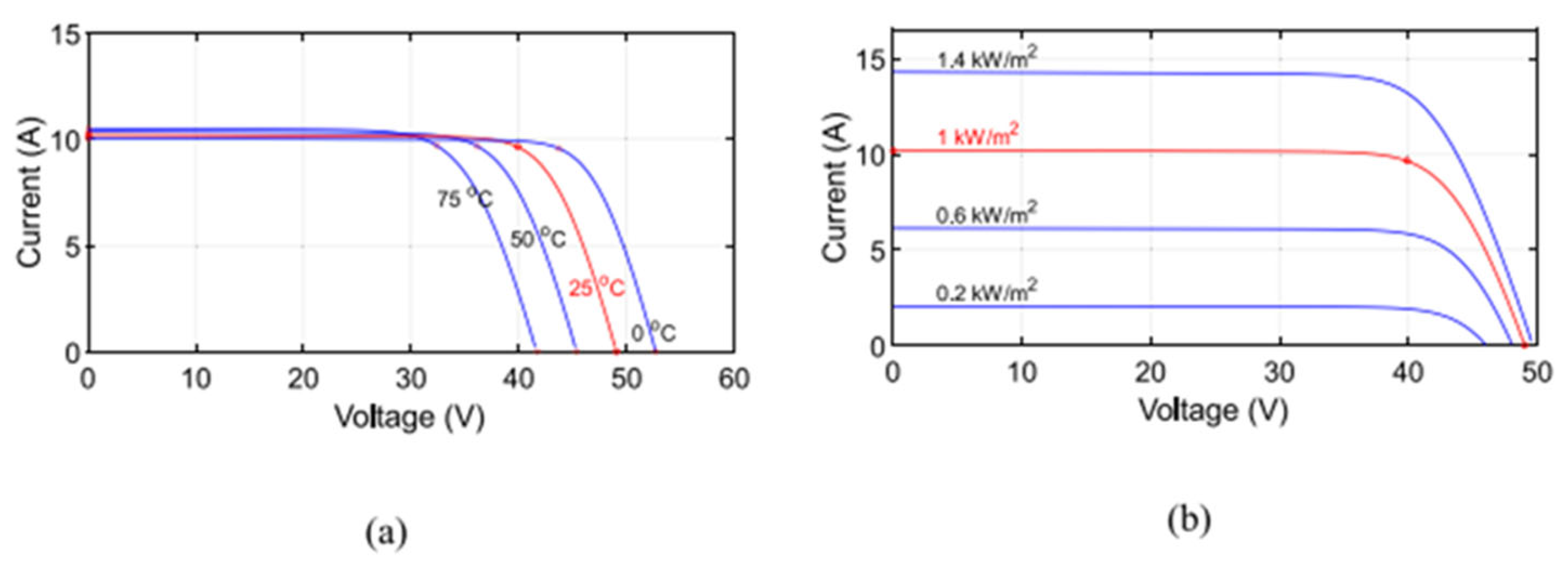
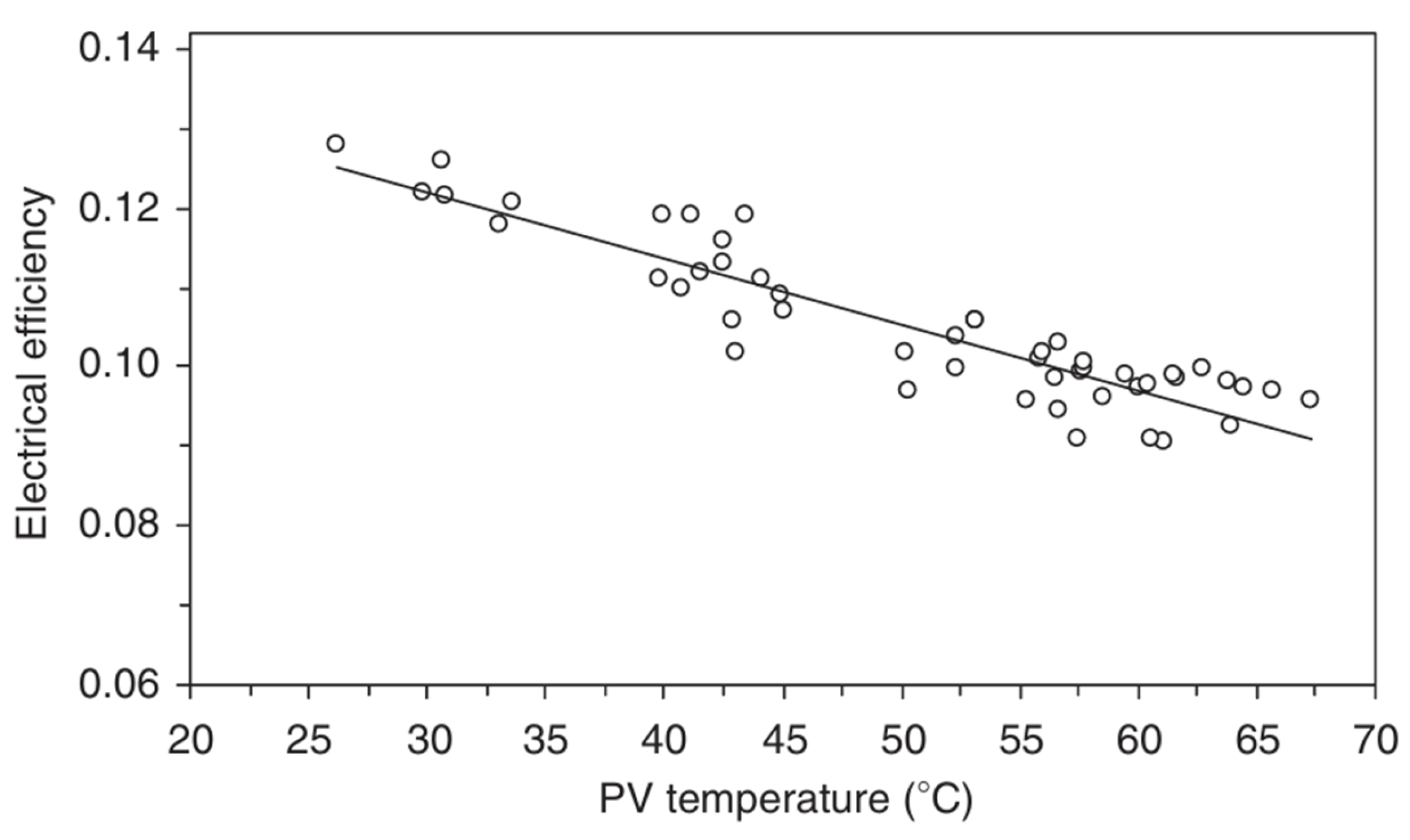
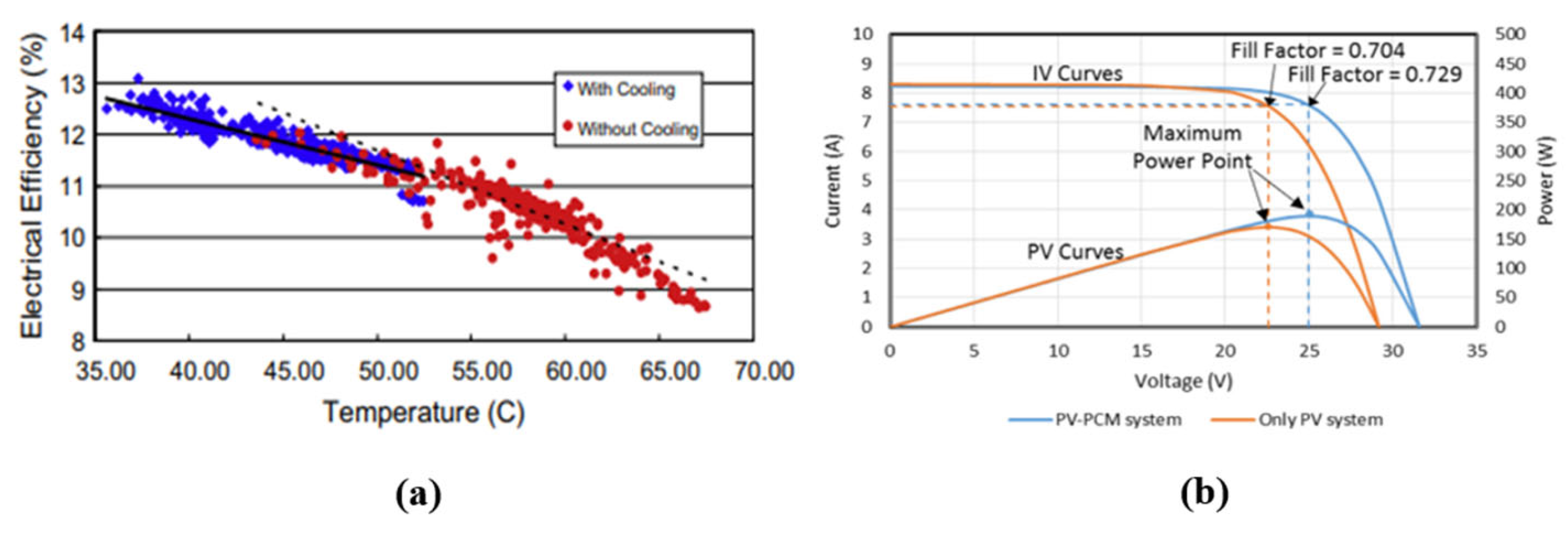
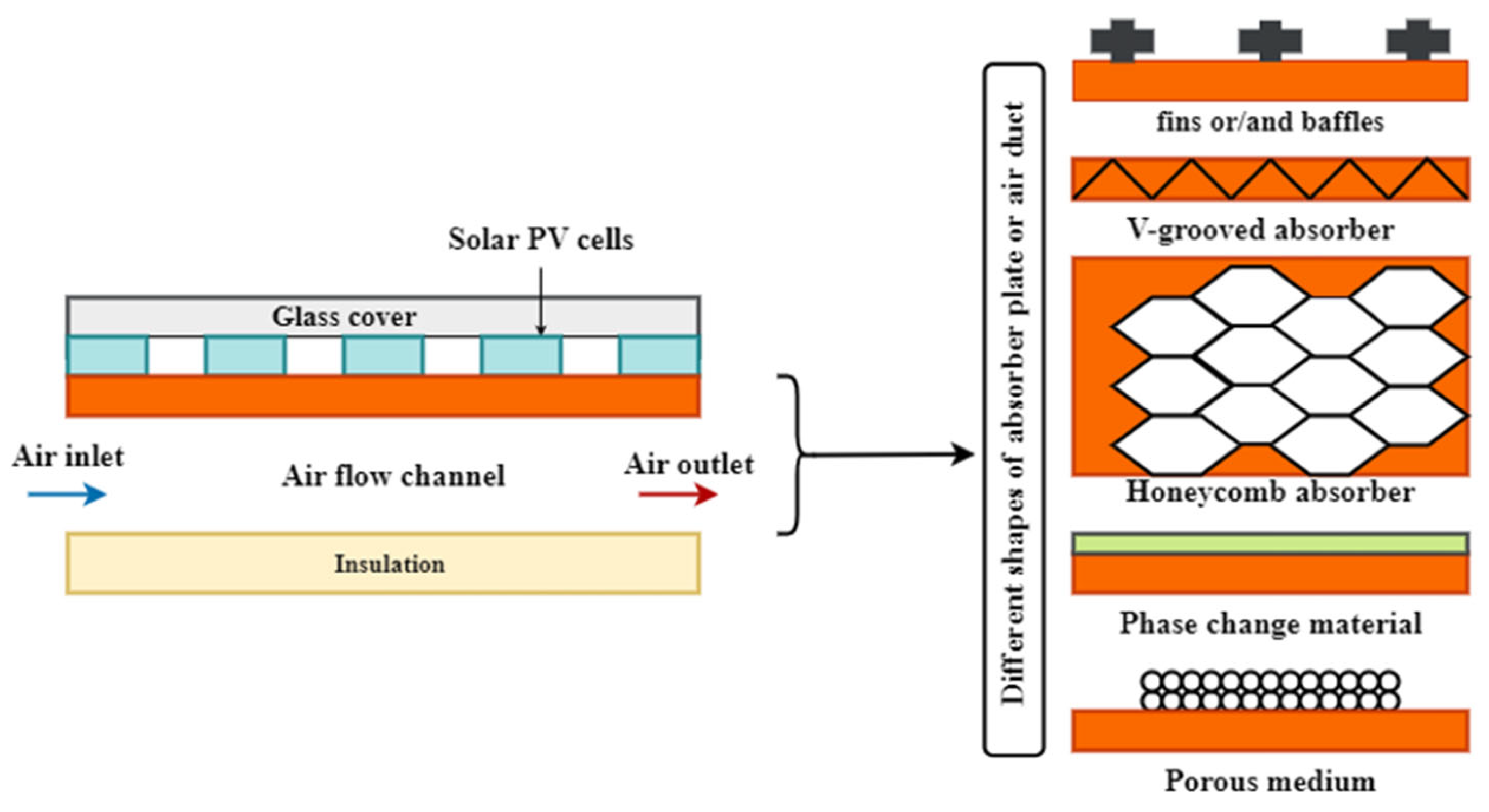
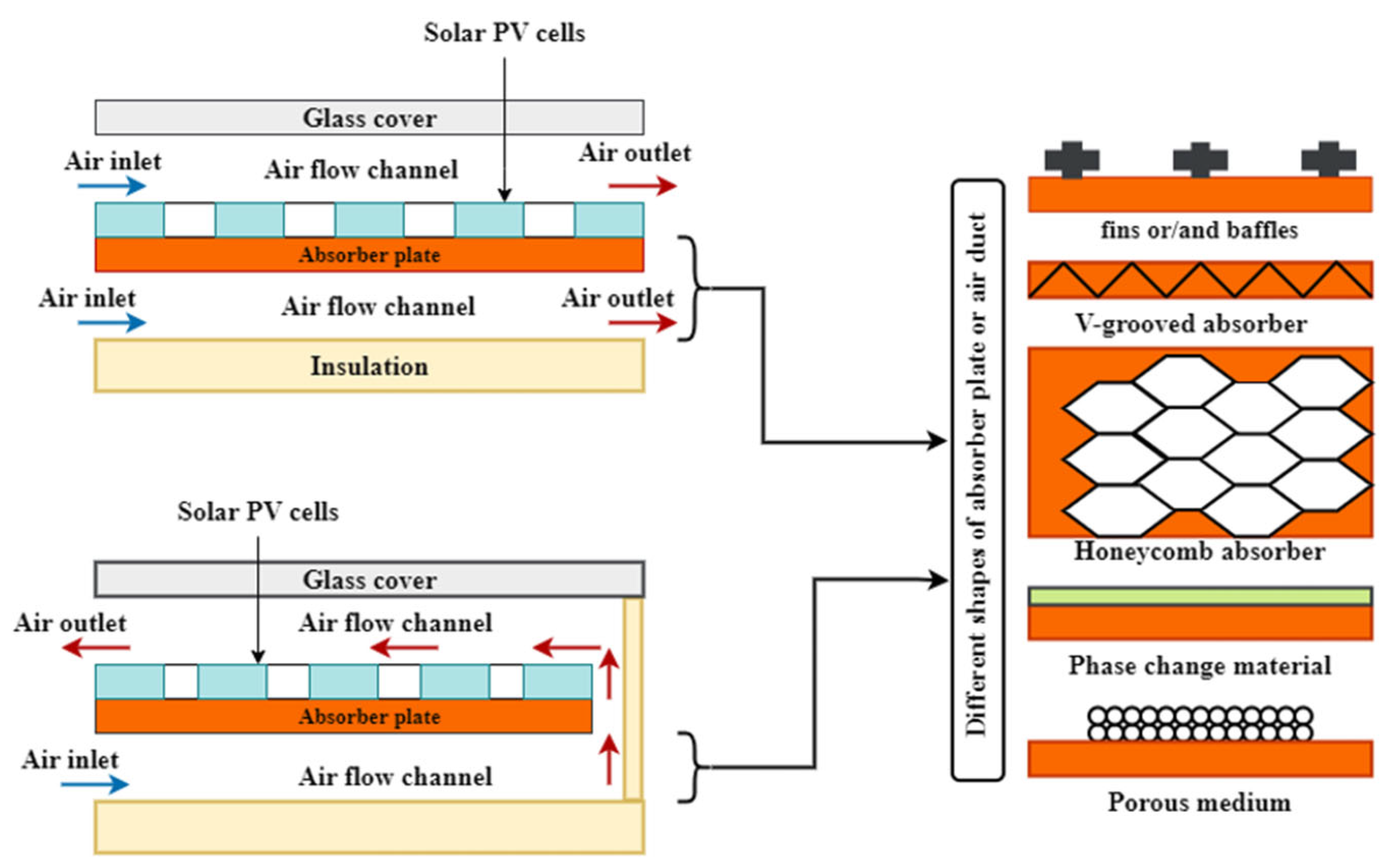
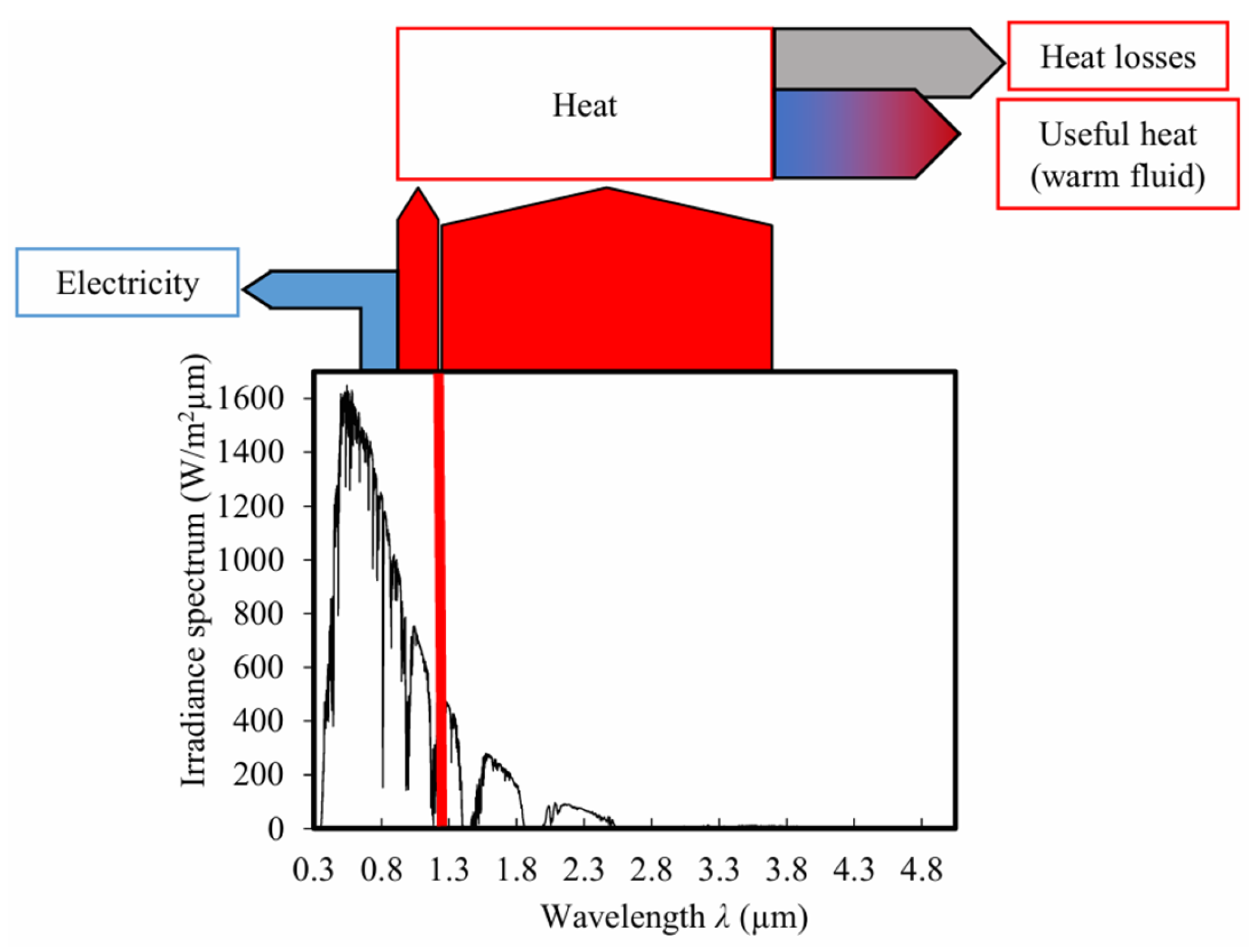
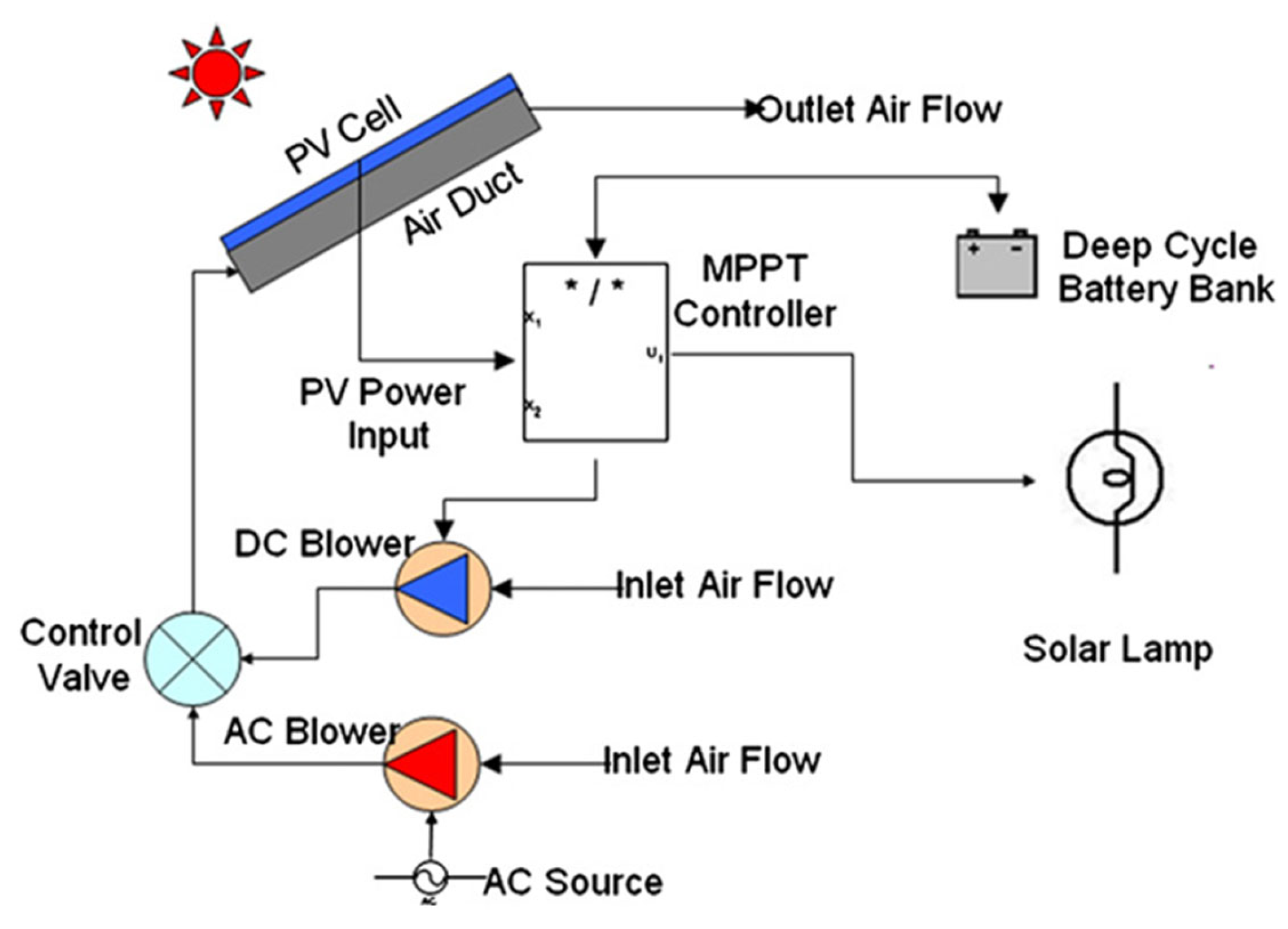
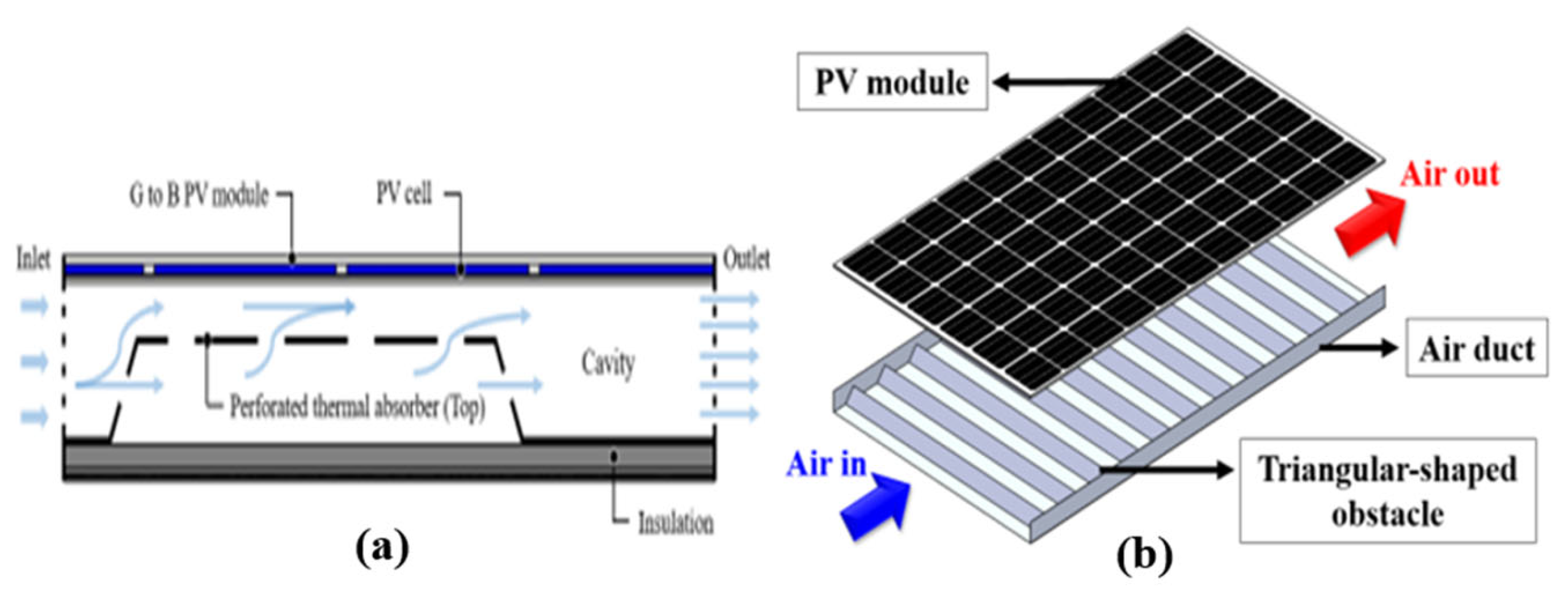



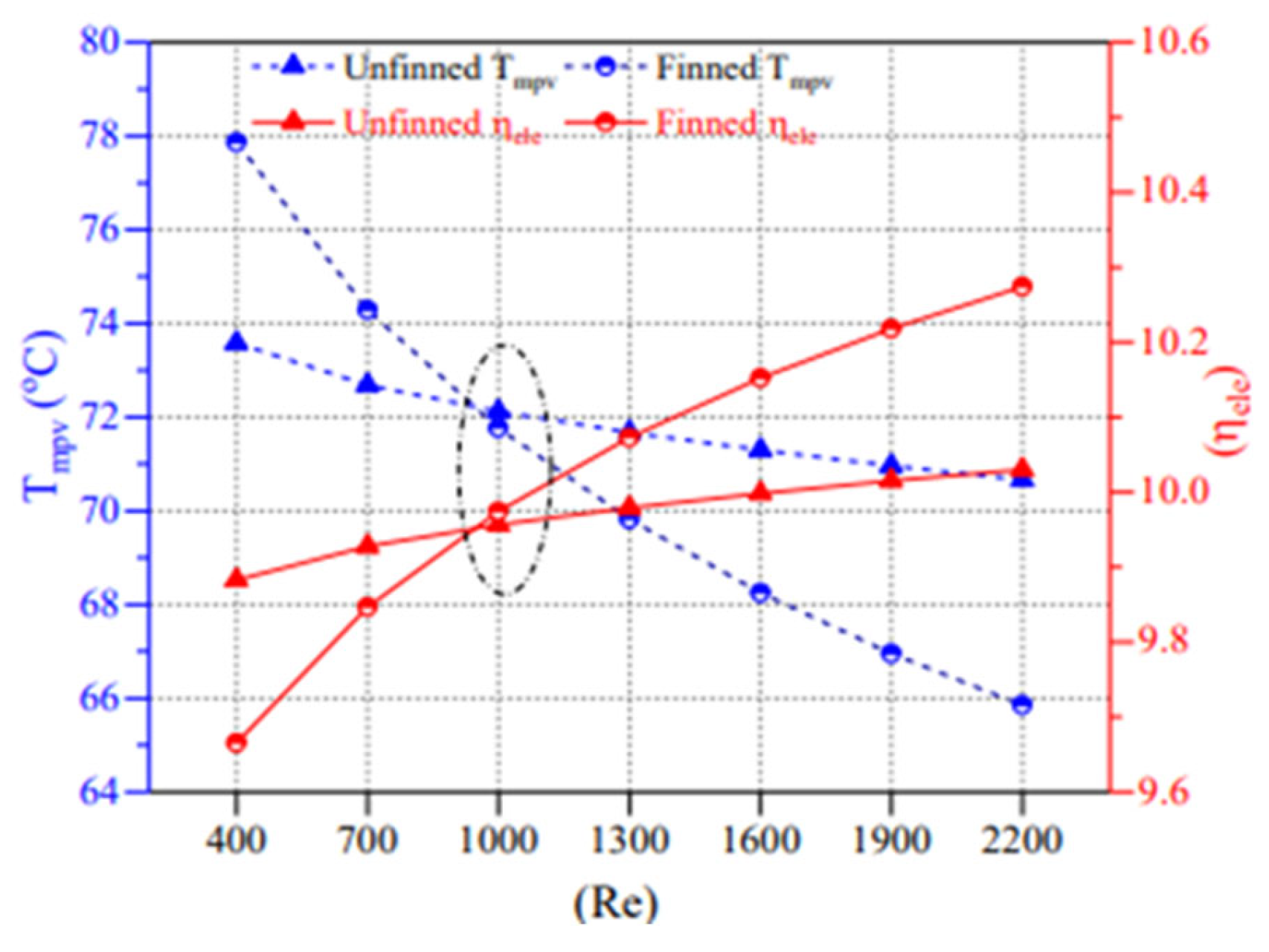
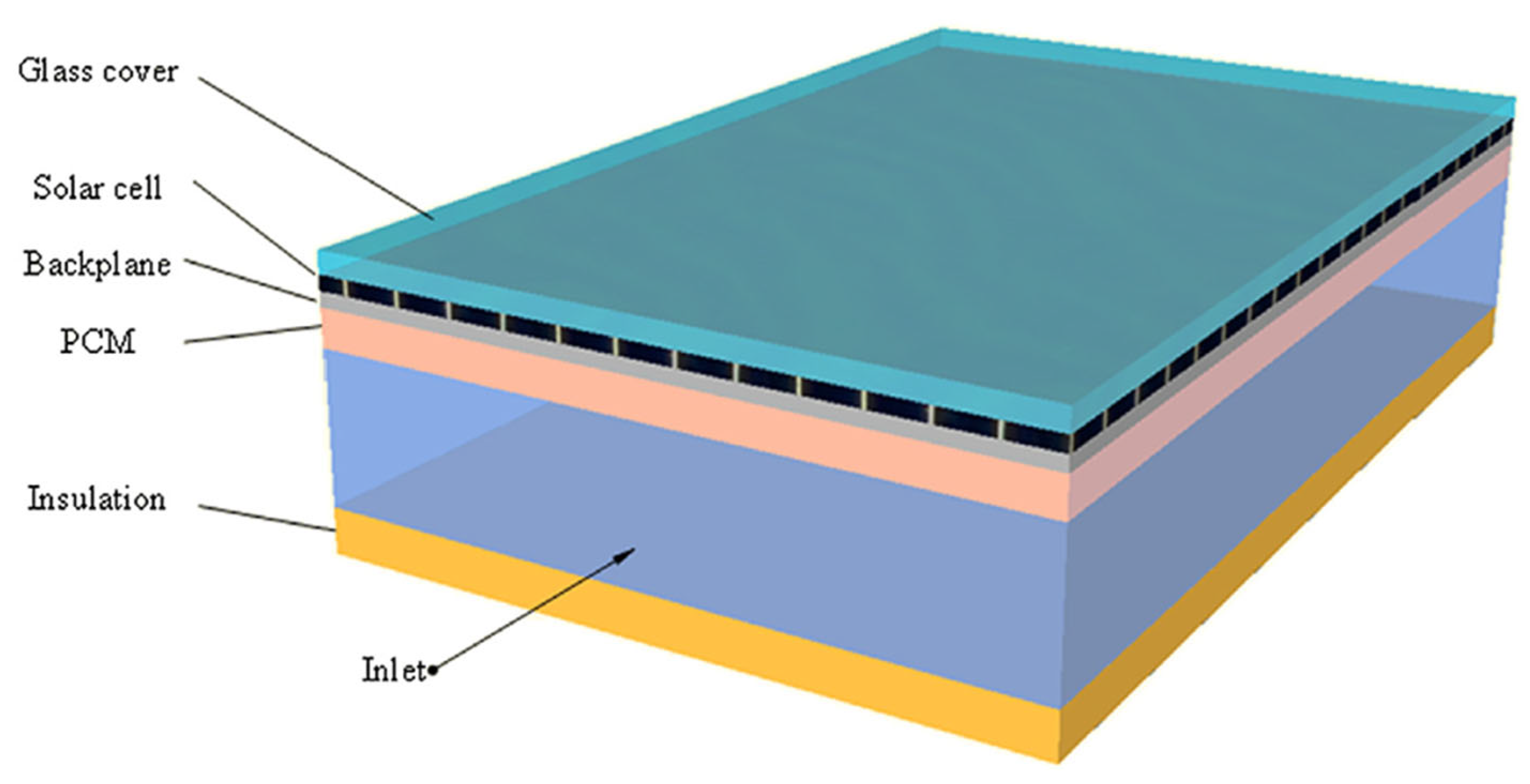
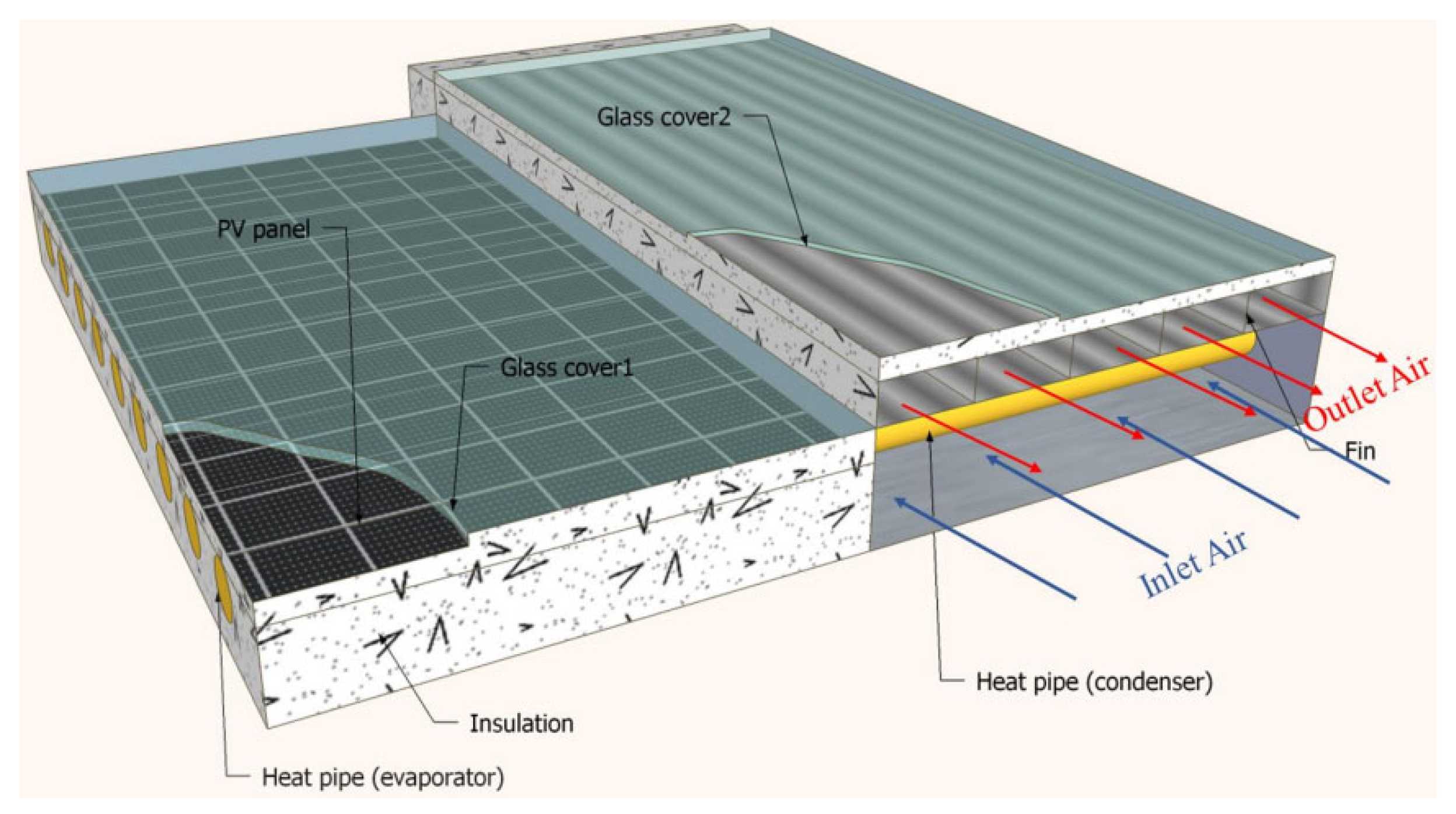

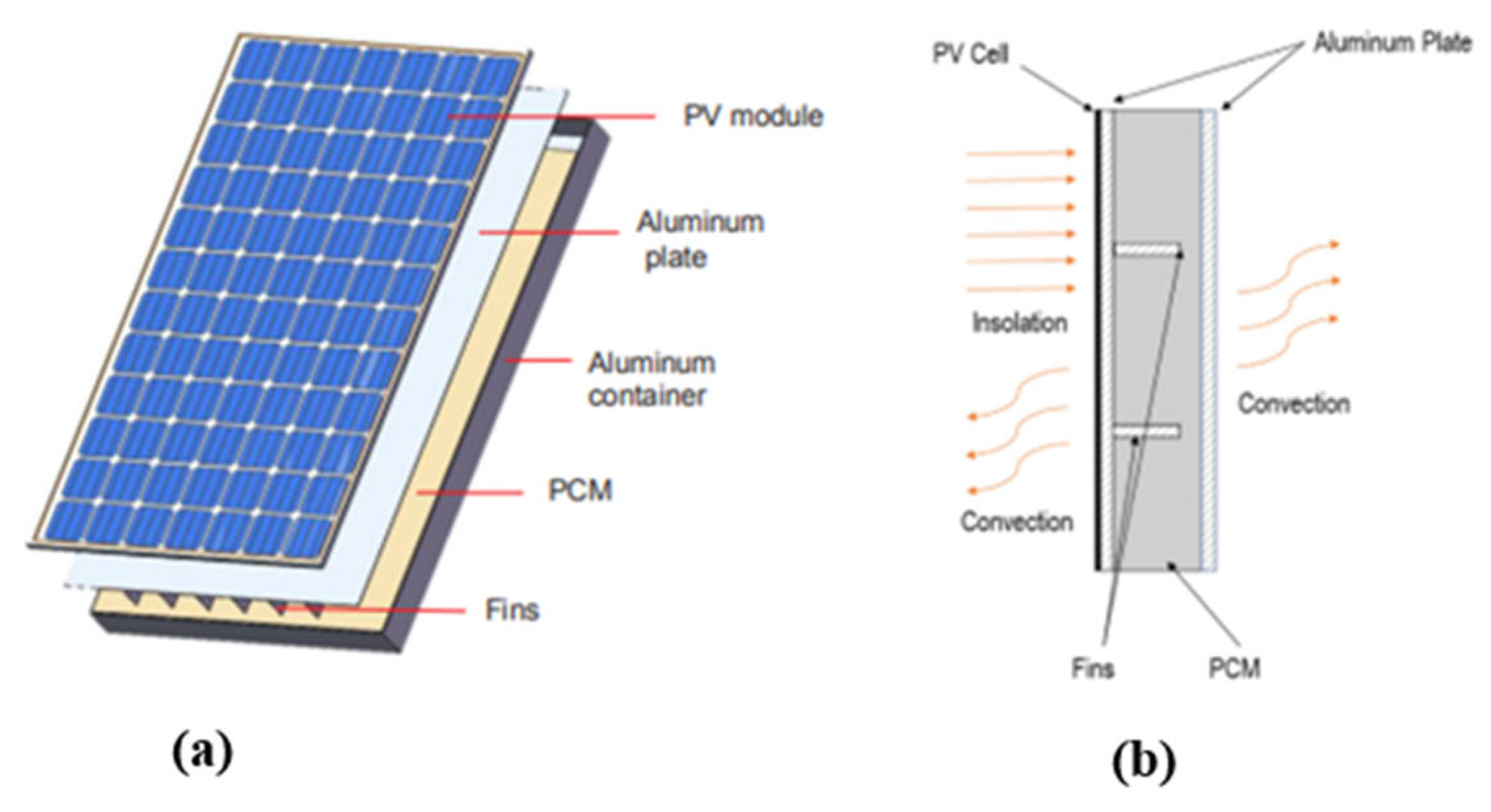
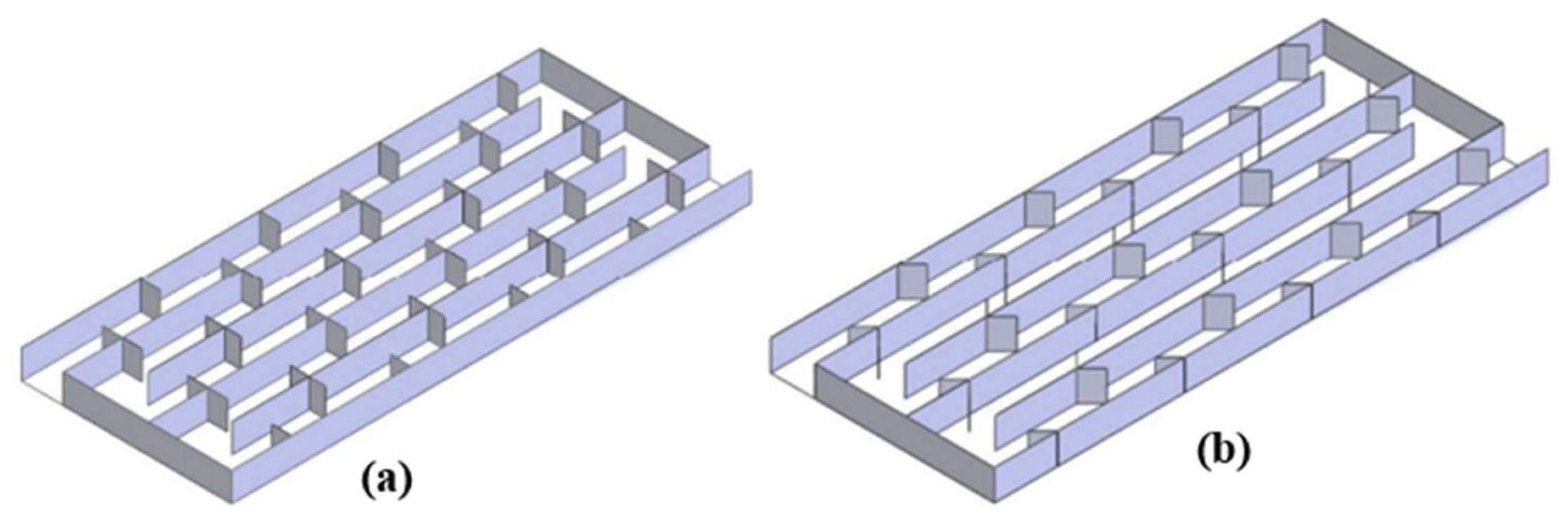

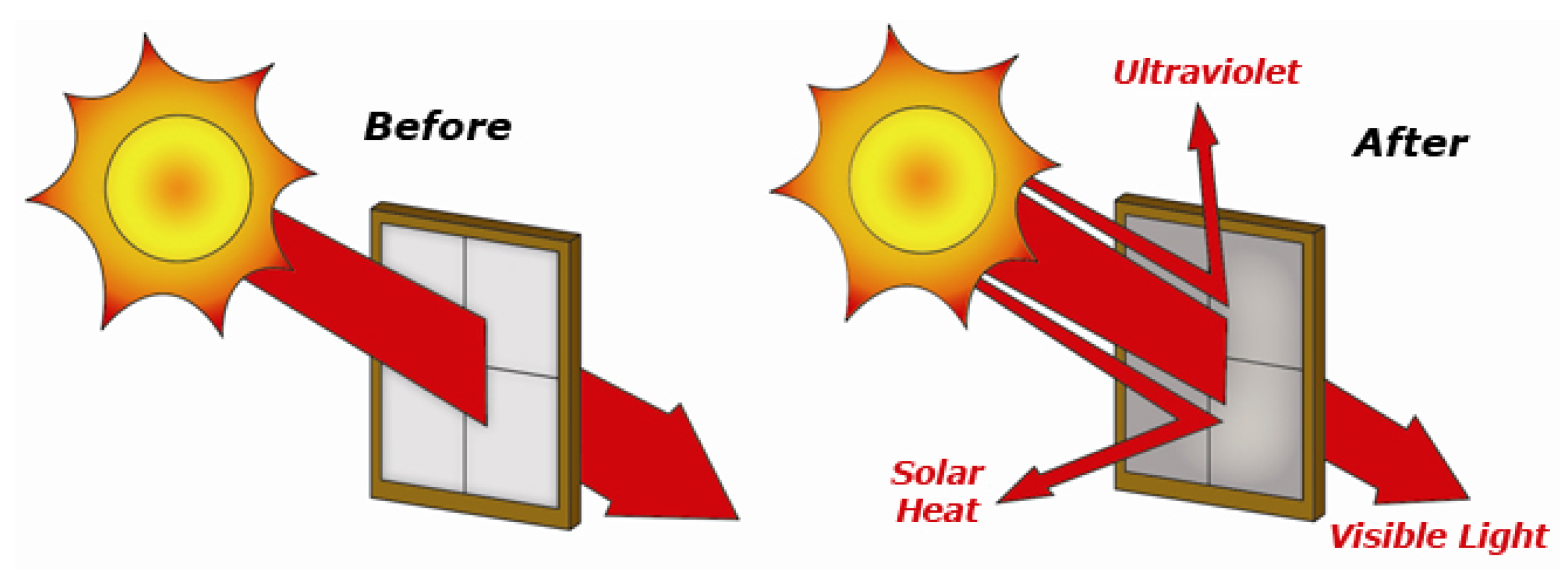

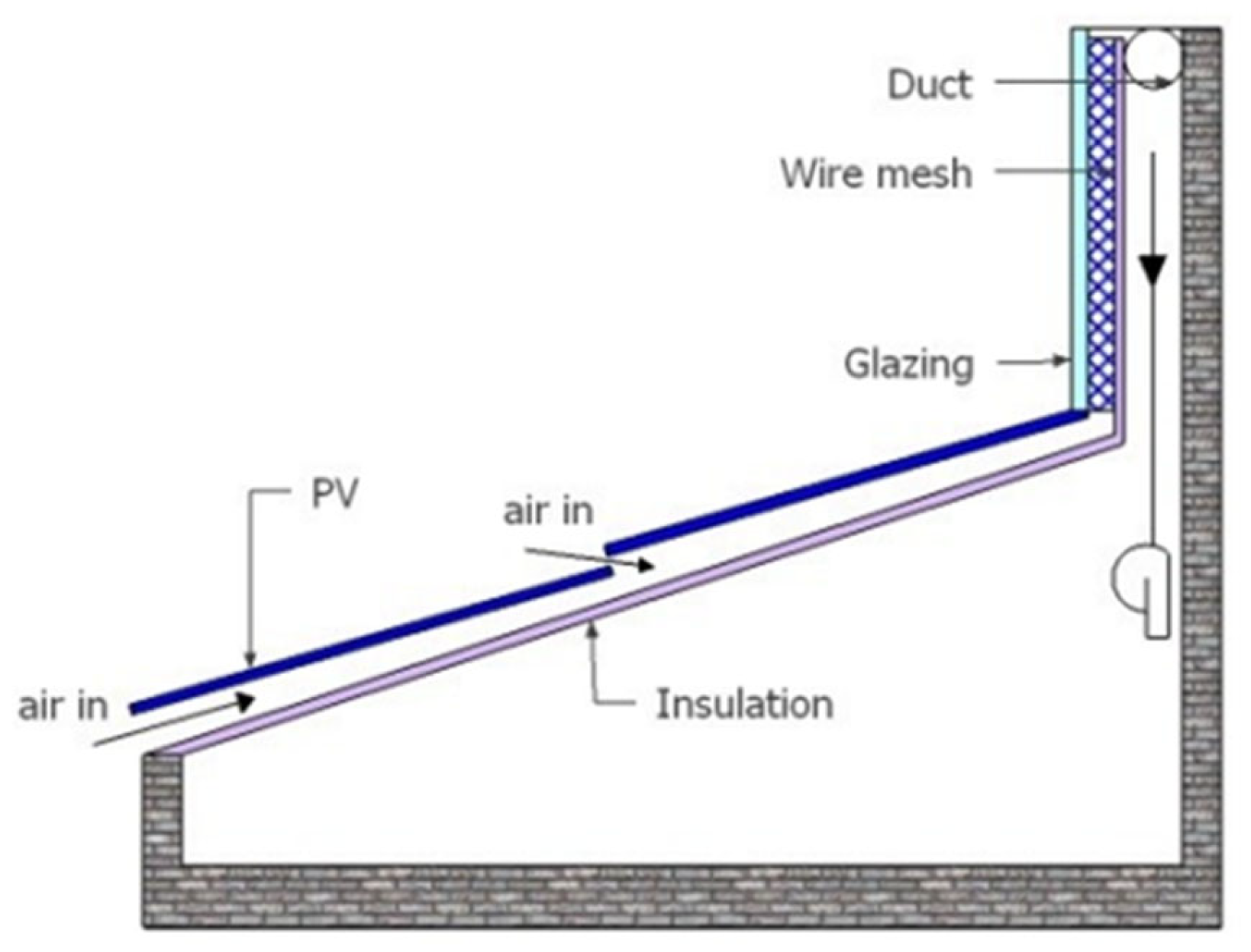
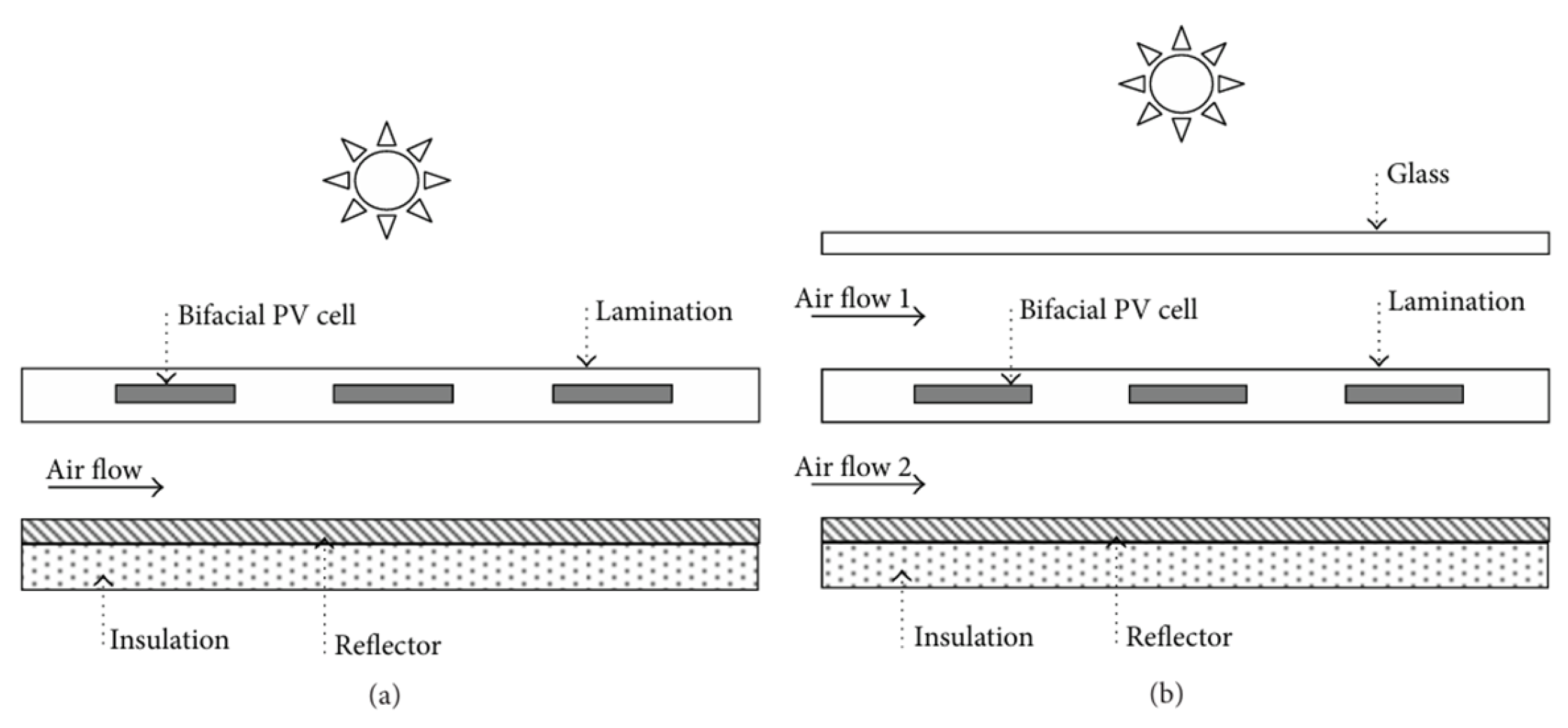
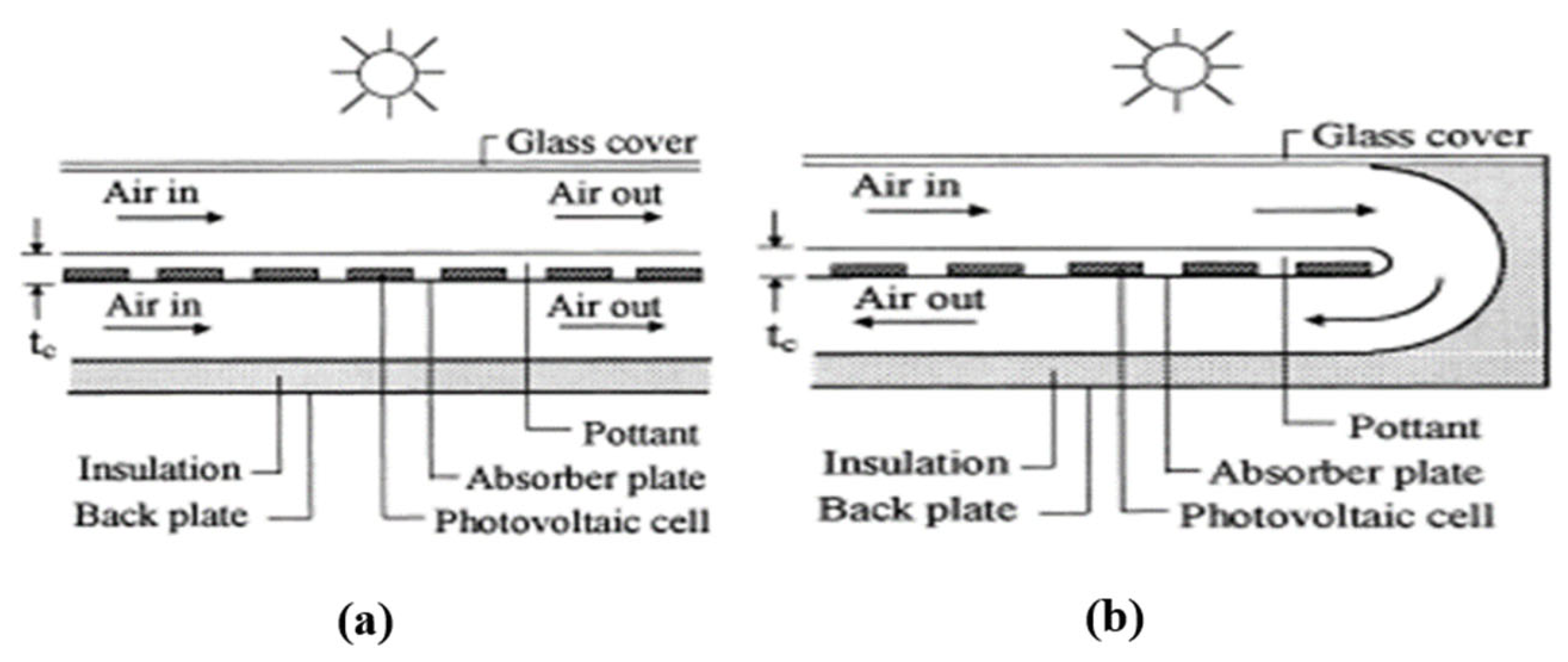

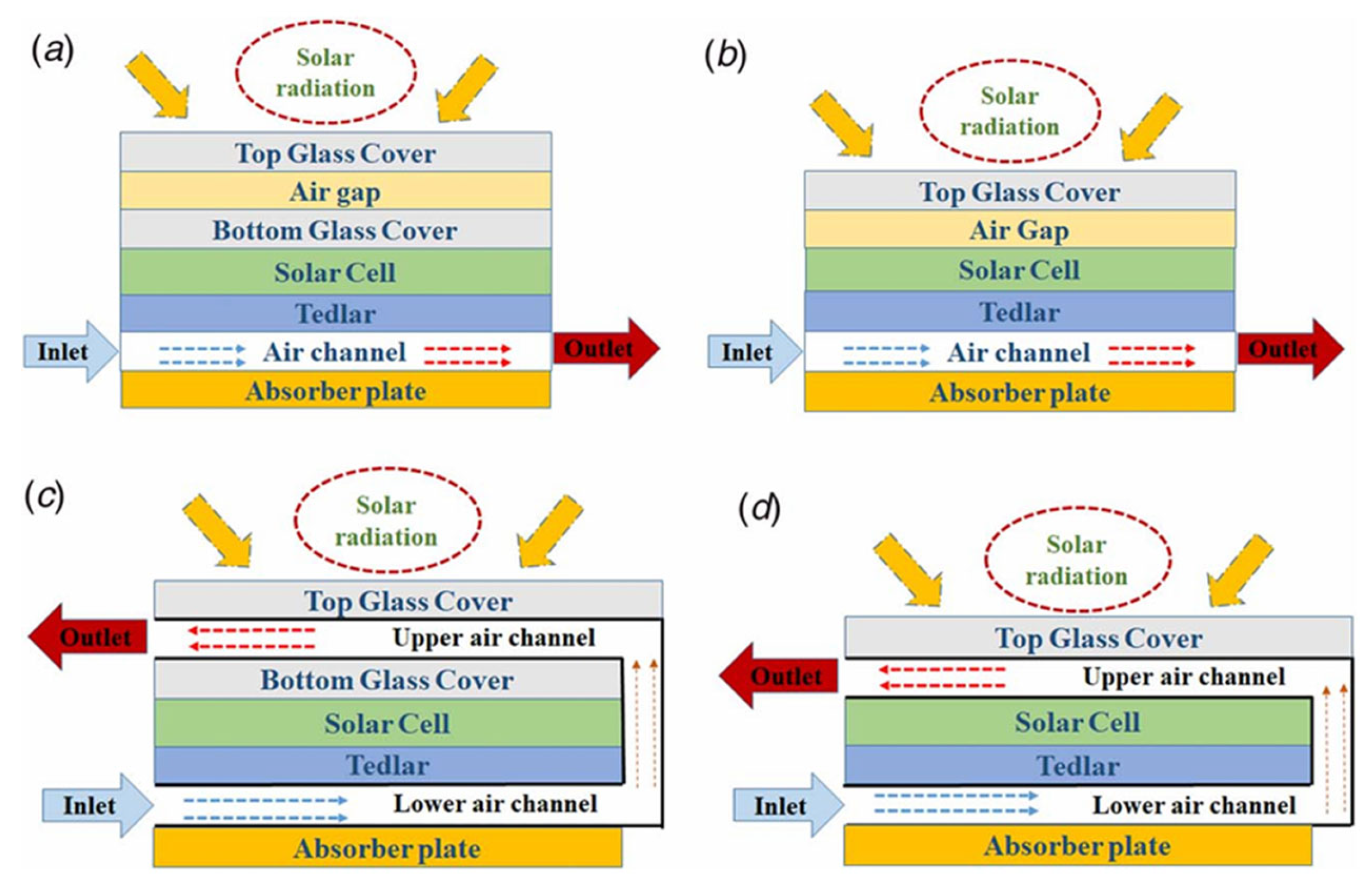
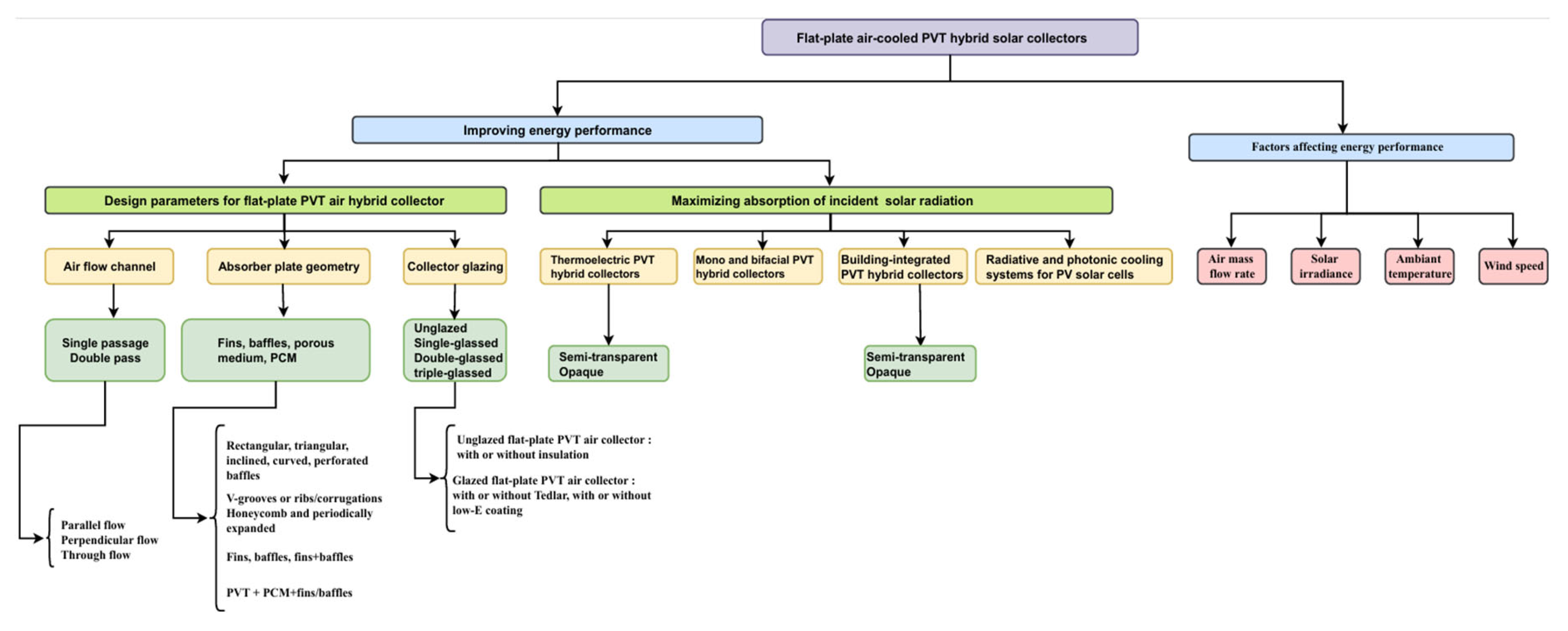
Disclaimer/Publisher’s Note: The statements, opinions and data contained in all publications are solely those of the individual author(s) and contributor(s) and not of MDPI and/or the editor(s). MDPI and/or the editor(s) disclaim responsibility for any injury to people or property resulting from any ideas, methods, instructions or products referred to in the content. |
© 2024 by the authors. Licensee MDPI, Basel, Switzerland. This article is an open access article distributed under the terms and conditions of the Creative Commons Attribution (CC BY) license (https://creativecommons.org/licenses/by/4.0/).




